This post may contain affiliate links. Please read our disclosure policy.
A bowl of warming, saucy, and little spicy Dan Dan Noodles recipe (dan dan mian), made with shirataki noodles, crispy ground pork crumbles, creamy dan dan sauce, and Sichuan chili oil is a flavor explosion that will wow your taste buds! Pair this Sichuan-inspired dan dan mian with blanched Asian leafy greens and finish with a touch of toasted nuts, I guarantee this Keto take on dan dan noodles will leave you wanting for more!
Love more Chinese noodle recipes? Then you must also try my Spicy chicken noodle soup, Taiwanese dan dan noodles (dry version), or Garlic chili noodles. You’ll be hooked in one bite!
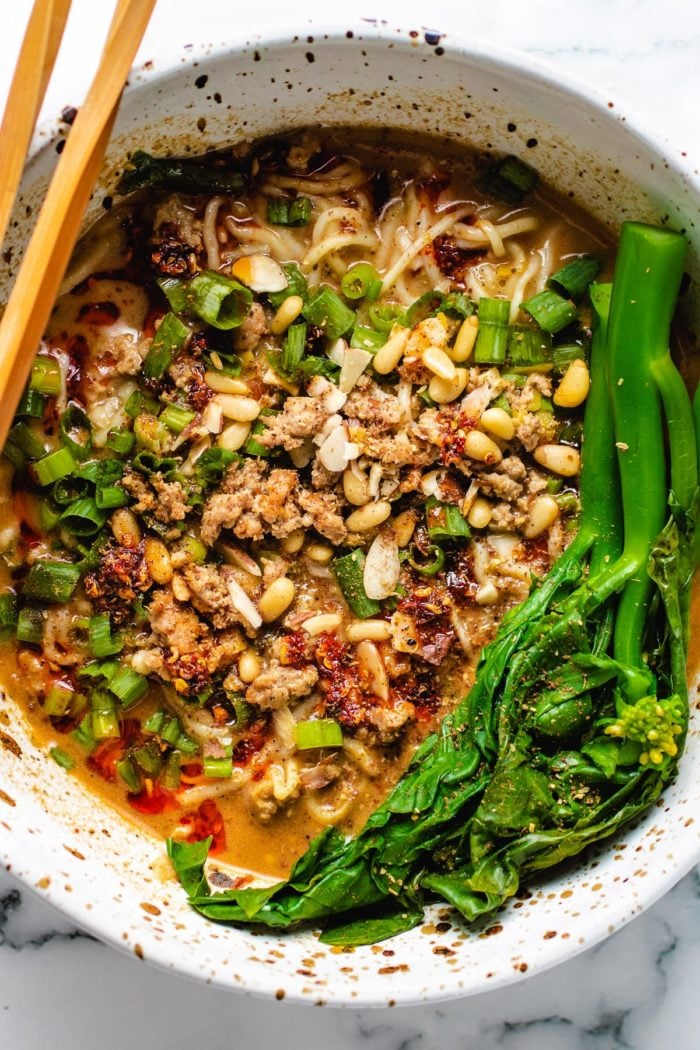
Today’s Sichuan-inspired dan dan noodles are my reinterpretation of my grandmother’s (my father side’s family) recipe. Whenever I enjoy this dish, it brings back so many fond childhood memories. Since most of us are staying home and can’t travel much, I thought why not re-make my grandmother’s Sichuan dan dan main keto, paleo, and gluten-free.
You do need to gather a few store-bought ingredients to make this dish taste extra authentic and the results are unbelievably delicious, plus I’ve provided some substitution suggestions, too!
A few years ago when I just started blogging, I shared a paleo dan dan noodles on the blog. That was my take on the Taiwanese-style dandan noodles – sweeter and milder in taste. The flavor profile of Sichuan dan dan noodles is slightly different – savory, smoky, numbing, and little spicy. If you are a lover of authentic Chinese cuisine but are on a low carb or gluten-free diet, this is the dish for you!
Table of Contents
- What are dan dan noodles?
- How to make dan dan noodles
- Dan Dan Mian Key Ingredients (paleo, whole30, gluten-free)
- Garlic chili Sauce
- Sichuan peppercorn powder
- Chinese sesame paste + substitute
- Protein choice – ground pork
- Sui Mi Ya Cai – or preserved mustard green + substitute
- Tips for the best dan dan noodles
- What Goes Well With Dan Dan?
- More Low Carb Chinese-Inspired Dishes
- Dan Dan Noodles Recipe (keto, paleo, Sichuan-inspired)
What are dan dan noodles?
Dan dan noodles (擔擔麵) are one of the most iconic Sichuan street foods. There are four main components of the dish – freshly boiled thin round-shape noodles, crispy fried ground pork, dan dan noodle sauce, and blanched vegetables. They are served either dry or in a spicy broth. Different chefs have slightly different take on the dish.
Because it’s street food, the noodles are served in small bowl quantities and meant to be eaten as a quick savory snack on the streets. The ground pork is almost over fried to crispy crumbles and sprinkled on top of the noodles with the sauce. For today’s version I decided to go with more broth. It’s perfect for colder months and warms you up in a hurry. 🙂
When the dan dan noodles recipe was reinterpreted in the west, it became more of a pasta-ish style dish – boiled noodles with meat sauce on top. And the flavor profile is much sweeter, less spicy, and doesn’t have much of the numbing sensation from the Sichuan chili oil and peppercorns.
Ground pork is the protein choice to make a bowl of authentic dandan noodles. It has the perfect lean and fat ratio and has a naturally sweeter taste that makes the dish extra tasty.
Since dan dan mian is very popular, you can find different interpretations of the dish. For example: Taiwanese versions of dan dan and Japanese take on the tantanmen ramen.
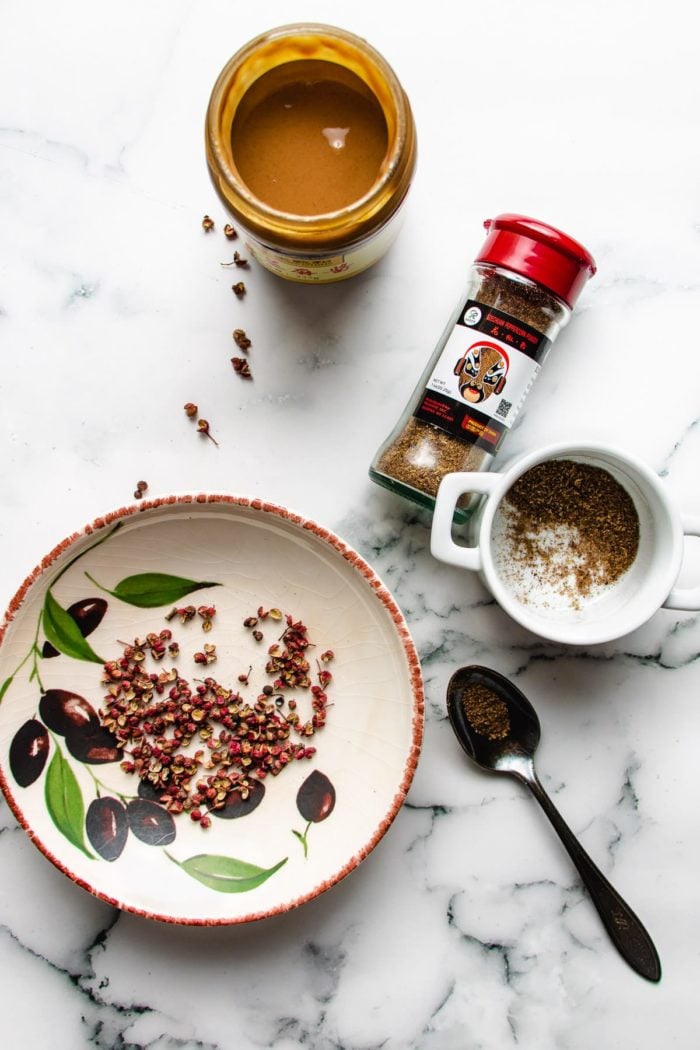
How to make dan dan noodles
The best dan dan noodles are made in layers, meaning they aren’t tossed together in one pot. Below are the four major layers and note that I use paleo and gluten-free ingredients to make my dish taste as close to authentic as possible and I also use store-bought ingredients to simply the dish.
- Dan dan noodle sauce: Mix Sichuan chili oil (I use store-bought) with little chicken stock, aged balsamic, coconut aminos, ground Sichuan peppercorn powder, and Chinese sesame paste.
- Ground pork: fry the ground pork until it’s almost over cooked to crisp crumbles then simmer it with the sauce and little chicken stock. The USDA recommends to cook ground pork until browned, or until the internal temperature reads 160 degrees F (71 degrees C).
- Toppings: blanched Asian vegetables such as bok choy, yu choy, or Chinese broccoli.
- Mix everything in a bowl and enjoy!
Here’s an overview of what you need and where to get those ingredients
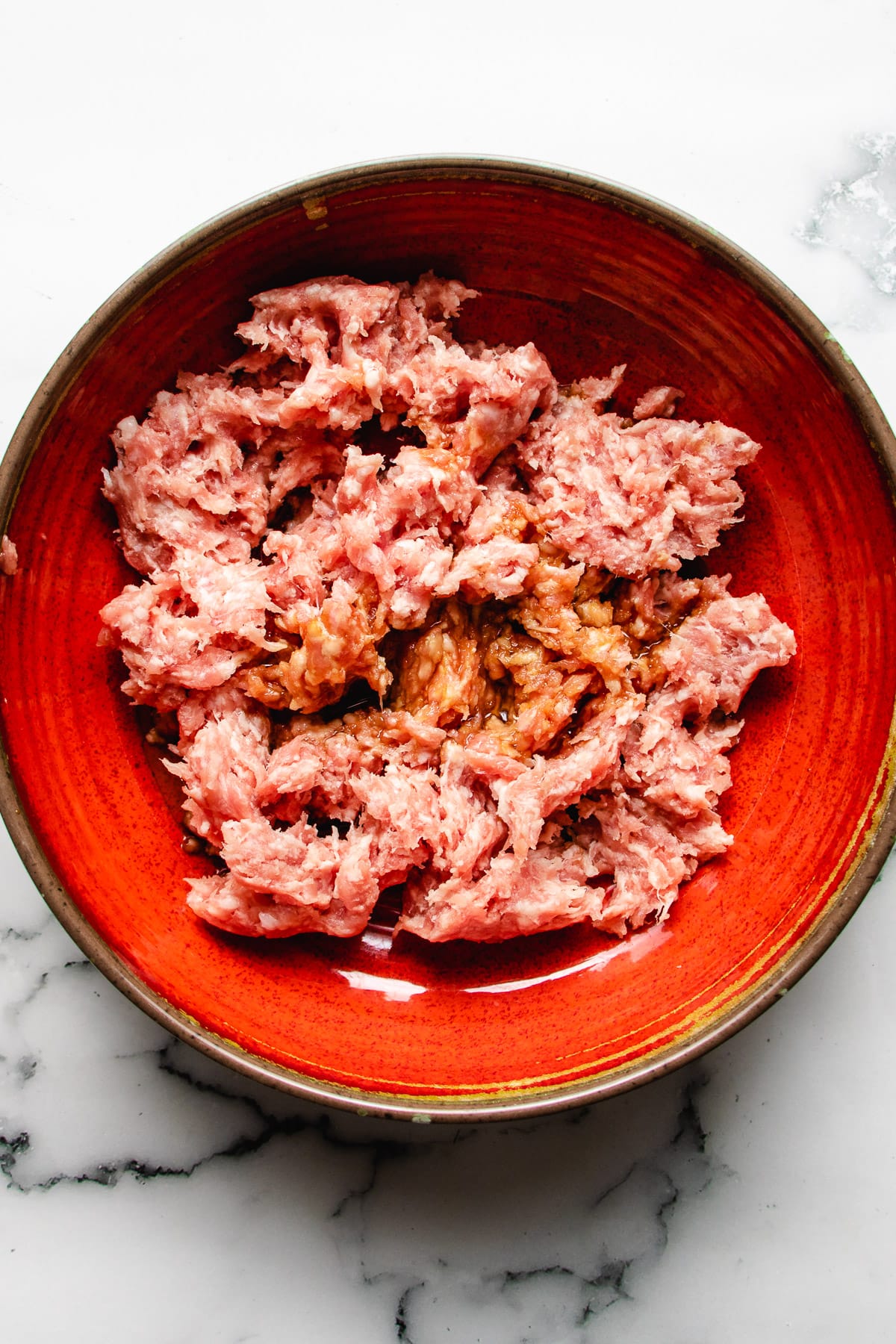
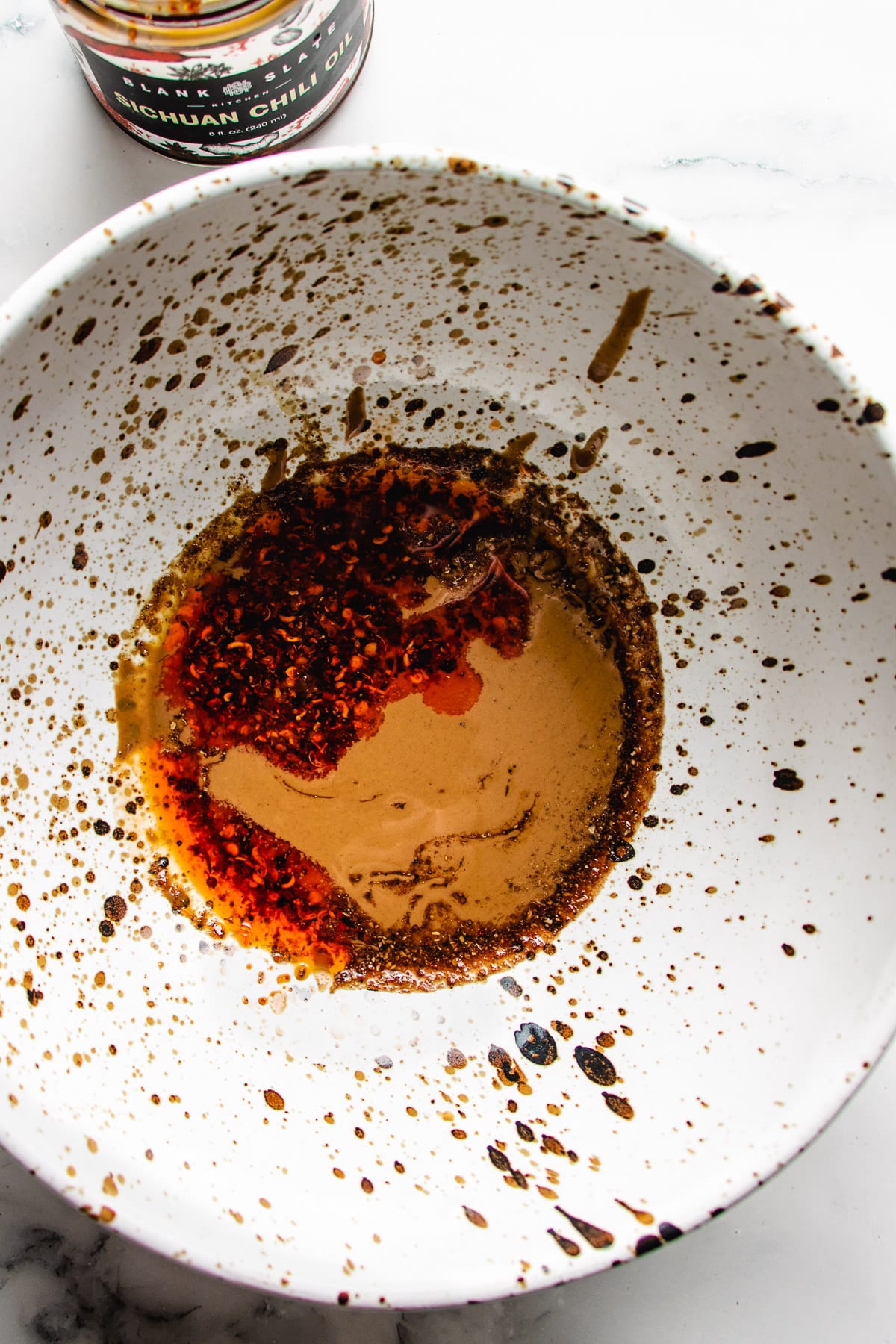
Dan Dan Mian Key Ingredients (paleo, whole30, gluten-free)
Garlic chili Sauce
My homemade version of Garlic chili sauce takes only 15 minutes to make! It’s Keto friendly and we use only the best oil.
If store-bought, I recommend a brand called Blank & Slate. It has no added sugar. If you love Sichuan cuisine, you can use the same bottle for my Chinese crystal dumplings, pan-fried keto potstickers, or dim sum.

Sichuan peppercorn powder
This is a new item I lately discovered on Amazon. The powder dissolves well in the dan dan noodle sauce. You can also use it to sprinkle on top of the noodles if you prefer extra peppercorn flavor.
If you happen to have whole Sichuan peppercorns, you can use that, too. You can lightly dry roast the whole peppercorns and grind them to fine powder. Just remember that the flavor will be more concentrated as you’ll bite into whole peppercorns as opposed to mixing the powder form into the sauce. Locals often do a combination – powder + whole peppercorns.
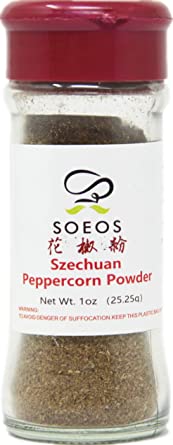
Chinese sesame paste + substitute
Chinese sesame paste tastes different from tahini. The flavor has a nice toasty flavor, almost roasted. The version I love is from Mala market. If it’s out of stock, try this Chinese brand version.
If you are okay with peanut butter, this will be the next best thing to use. Mix the peanut butter with a few drops of toasted sesame oil.
If you can’t have peanuts, then use Soom brand tahini. Although tahini tastes different from Chinese sesame paste, you can still make this dish and get a similar flavor profile even if you don’t have everything handy.
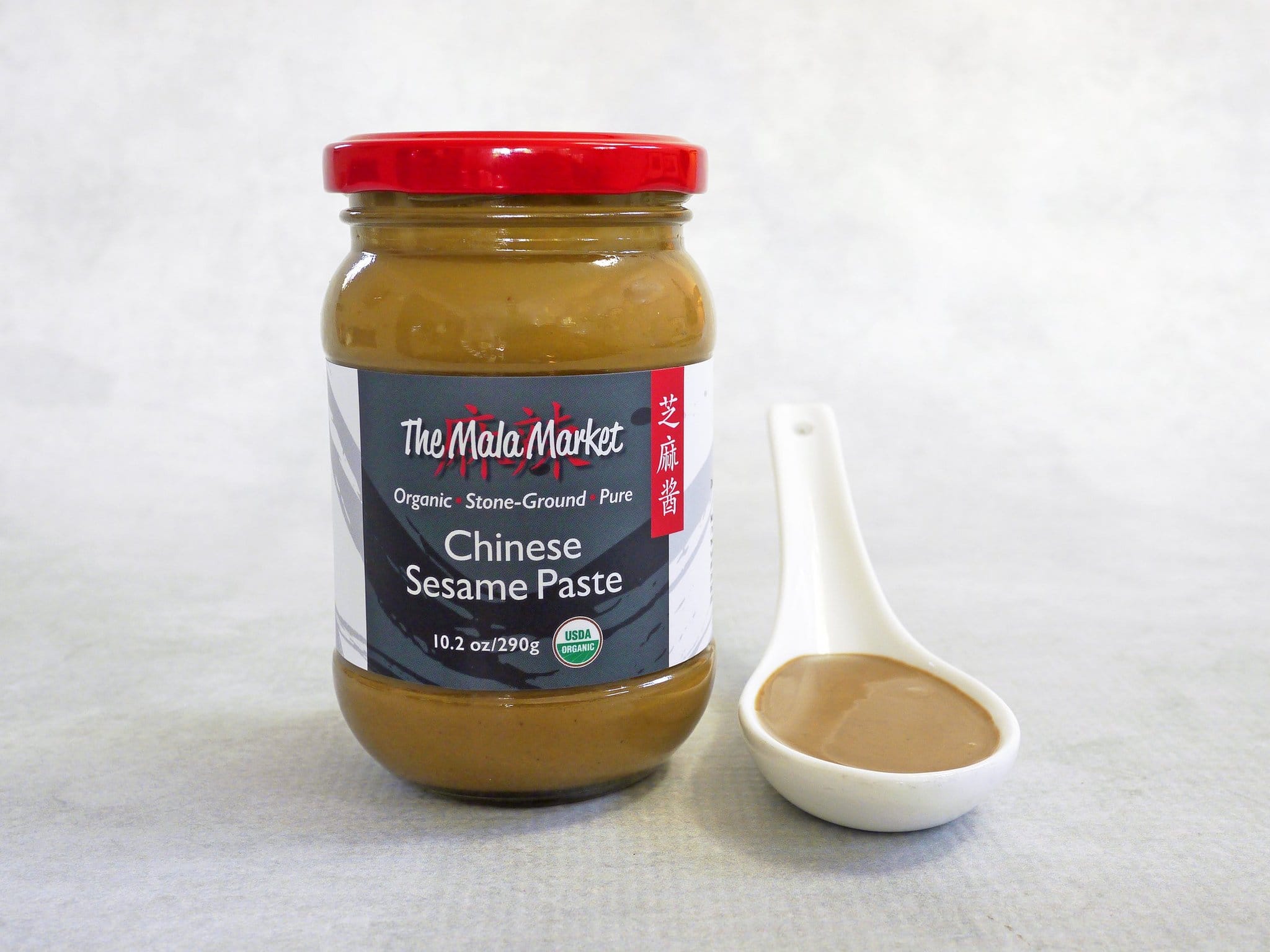
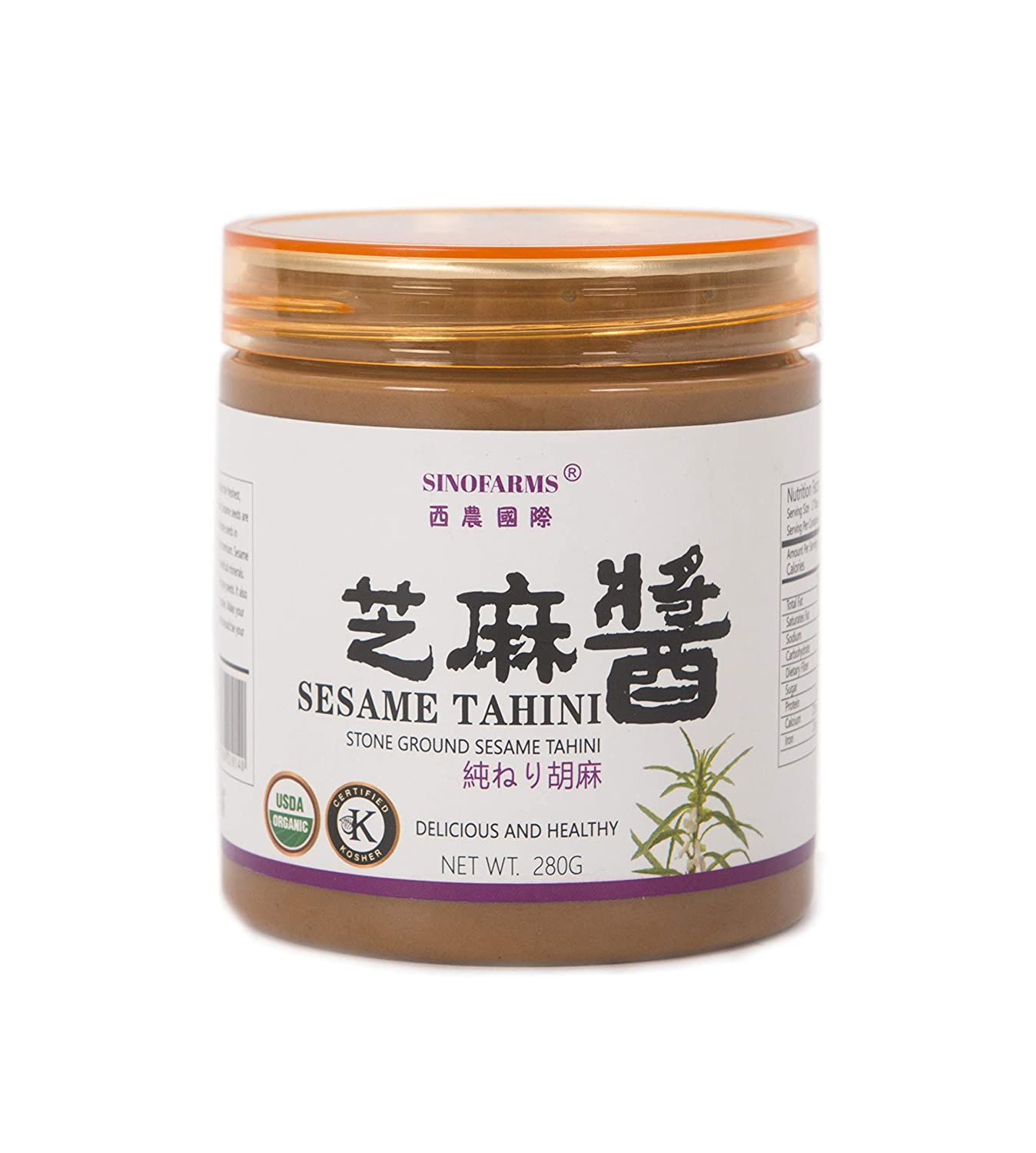
Protein choice – ground pork
Ground pork is the most popular protein choice in Asian cuisine. It browns nicely and quickly in a hot wok and has the perfect fat-to-lean ratio. I like to shop for pasture-raised organic pork as it has a nice mild sweet taste that takes on many dishes well. Any ground pork from your local retailer will also work great.
Sui Mi Ya Cai – or preserved mustard green + substitute
To a local, this ingredient makes dan dan noodles taste extra special. I didn’t use it in my recipe today because it’s harder to find even in Chinese grocery stores and it has added sugar. You can make the dish without it. If you really want to be extra specific and can’t find Chinese pickled mustard greens, a simple substitute is pickled cucumbers. You can see how I use it as a substitute in my Whole30 dan dan noodles.
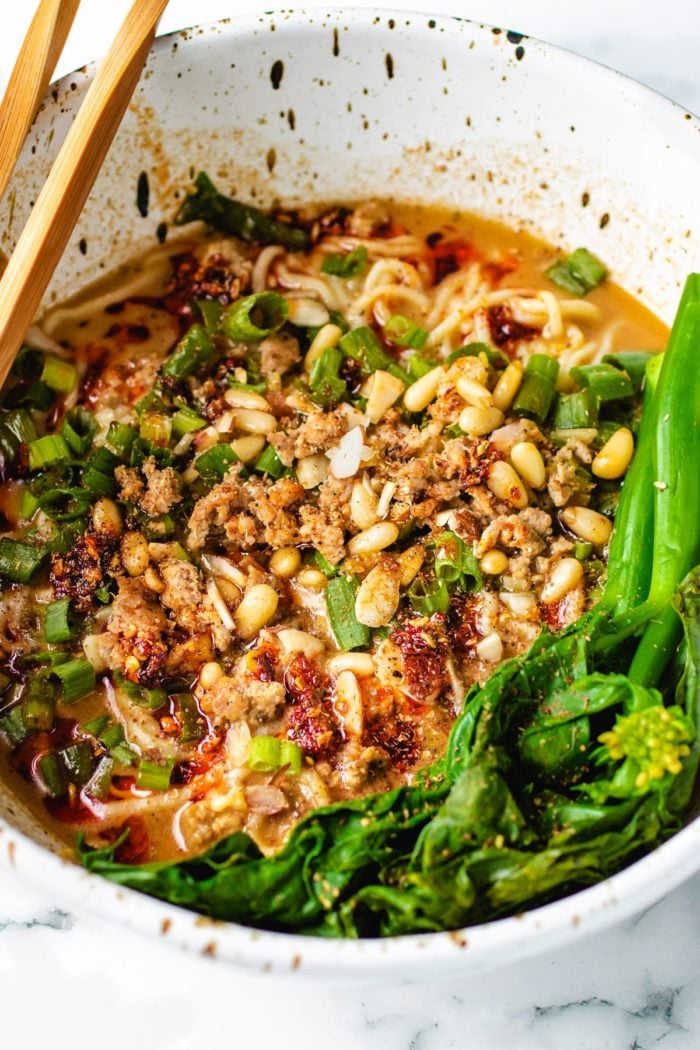
Please don’t feel intimidated by all the ingredients! They are the key elements to make your dan dan noodles extra tasty and authentic. As I said, once you have them handy, this keto dan dan noodles recipe comes together quickly and the results are super rewarding!
Tips for the best dan dan noodles
- You might not have Sichuan chili oil, Sichuan peppercorn powder, and Chinese sesame paste in the pantry but trust me, they are the reasons why Sichuan dan dan mian tastes so good! Plus, once you have them you can use them practically in almost all Asian-flavored dishes!
- To keep it low carb, I use shirataki noodles. You can also use spiralized zucchini noodles.
- To make the dan dan sauce, stir the sesame paste well in the jar before mixing with other ingredients so that your paste won’t be too thin.
- Ask your local butcher or farmers’ market vendors for organic and pasture-raised ground pork, if possible. It makes the dish taste extra authentic. Super yummy!
What Goes Well With Dan Dan?
You can serve the noodle soup as a one bowl meal but if you want it all out – an Asian-inspired banquet feast – pair the noodles with Tatsoi Salad, Chinese broccoli in garlic sauce, Mandarin chicken salad, Taiwanese sauteed cabbage, blanched bok choy salad, or Paleo Asian coleslaw. Browse more of my paleo side dishes archive.
More Low Carb Chinese-Inspired Dishes
- Sweet ginger pork
- Taiwanese dan bing
- Kung Pao Chicken
- Kung Pao Shrimp
- Cumin Beef
- Simmered Daikon with chicken
- Daikon potstickers
- Browse my Chinese/Taiwanese Dishes, made low carb, paleo!
This Sichuan-inspired dan dan noodles tastes savory, smoky, numbing, and a little spicy. Although it introduces a few new bottled seasonings but trust me, you can get them online (links included below) and once you have them in your pantry, the making dan dan part is super straightforward. And the result is a bowl of heartwarming, saucy, little sweet, and little spicy noodle bowls. SUPER GOOD!
Dan Dan Noodles Recipe (keto, paleo, Sichuan-inspired)
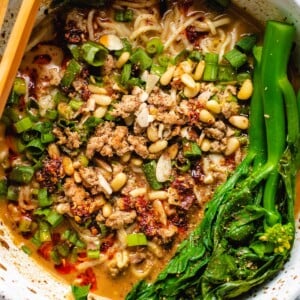
Ingredients
For the pork:
- 0.75 lb ground pork
- 1 tbsp coconut aminos
- 2 tsp toasted sesame oil
- 1.5 tbsp avocado oil
- 0.7 oz garlic cloves finely chopped, about 4 chubby ones
- 0.3 oz ginger finely chopped
- 4 pinches coarse sea salt
- 2 tbsp Chinese sesame paste or tahini (stir-well. see notes)
- 0.5 tsp Sichuan peppercorn powder or 1 tsp whole Sichuan peppercorns
- 2 cups chicken stock
Others:
- 1-2 bulbs scallions chopped
- 14 oz shirataki noodles or 2 medium spiralized zucchini noodles
- Toasted almonds or pine nuts
- Blanched bok choy or Chinese broccoli or Yu choy sum
For the dan dan noodle sauce (divide equally to 2 bowls):
- 2 tbsp Garlic chili sauce or more to taste
- 4 tbsp coconut aminos
- 2 tbsp chicken stock
- 2 tsp aged balsamic
- 4 tsp Chinese sesame paste or tahini (stir-well)
- 0.5 tsp Sichuan peppercorn powder
Instructions
- In a medium bowl, season the pork with coconut aminos and sesame oil. Mix well and set it aside.
- Prepare the garlic and ginger in one bowl. Scallions in another bowl and rinsed noodles on a plate. Preheat a wok or large saute pan over medium-low heat until it feels too hot to place your palm near the surface. Boil a pot of water to blanch the vegetables.
- Add the avocado oil to the wok and fry the pork over medium-high heat. Season with 2 pinches of salt. Break it to fine bits and cook until the pork is browned and turns into crisp crumbles, about 3-4 minutes.
- Add garlic and ginger to the pork. Saute for 10-15 seconds with 2 more pinches of salt, then add sesame paste and peppercorn powder. Continue sauteing for 30 seconds.
- Add the stock. Scrap the bottom of the pan to lift up the brown bits and nothing sticks to the pan. Cover with a lid. Lower the heat to medium-low. Allow it to come to a gentle boil, about 3 minutes. Keep the broth hot.
- In the meantime, assemble the dan dan noodle bowls. Divide the ingredients from Sichuan chili oil to peppercorn powder equally into two serving bowls. Stir well.
- Divide the noodles equally into the bowls. Place the vegetables next to the noodles. Ladle the pork mince and the broth over. Sprinkle with scallions and nuts. Drizzle with more hot chili oil and peppercorn powder, if desired. Stir the noodle bowl well and enjoy while it’s hot.
Notes
- Stir the sesame paste well in the jar before mixing with other ingredients so that your paste won’t be too thin.
- Garlic chili sauce – I highly recommend you have a jar of my homemade version handy! If you opt for using store-bought, a brand called Blank & Slate has no added sugar.
- Sichuan peppercorn powder
- The powder dissolves well in the dan dan noodle sauce. You can also use it to sprinkle on top of the noodles for extra flavor.
- If you use whole Sichuan peppercorns, you can lightly dry roast the whole peppercorns and grind them to fine powder. Just remember that the flavor will be more concentrated as you’ll bite into whole peppercorns as opposed to mix into the sauce in a powder form. Locals often do a combination – powder + whole peppercorns.
- Chinese sesame paste + substitute
- Chinese sesame paste tastes different from tahini. It has a toasty flavor. The version I love is from Mala market. If it’s out of stock, there are a few more choices on Amazon. Link above.
- If you are okay with peanut butter, this will be the next best thing to use. Mix the peanut butter with a few drops of toasted sesame oil.
- If you can’t have peanuts, then use Soom brand tahini. Although tahini tastes different from Chinese sesame paste, you can still make this dish and get a similar flavor profile even if you don’t have everything handy.
- Sui Mi Ya Cai – or preserved mustard green + substitute
- I didn’t use it in my recipe because it’s harder to find even in Chinese grocery stores. It also has added sugar. You can make the dish without it. If you really want to be extra authentic and can’t find Chinese pickled mustard greens, a simple substitute is to use pickled cucumbers. Chop them up to a tablespoon or two and add them to the pork when you saute it.
Nutrition
Nutrition information is automatically calculated, so should only be used as an approximation.
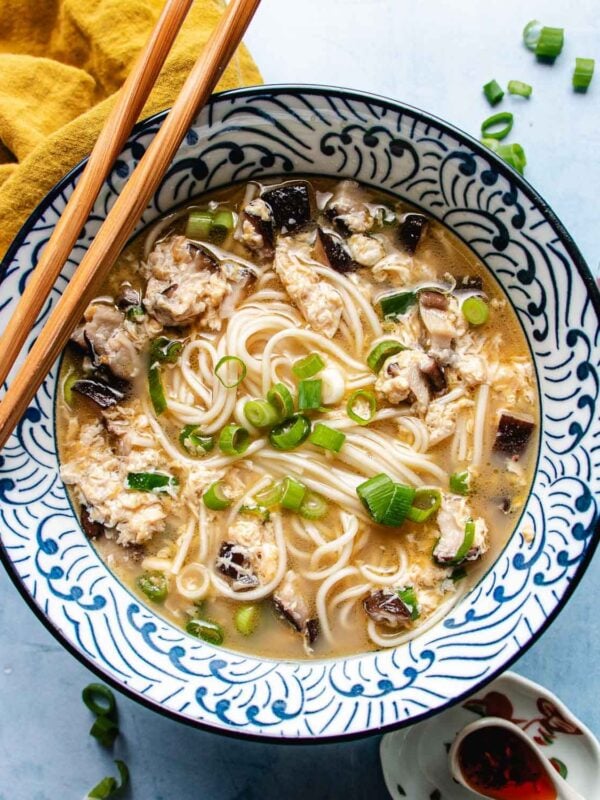
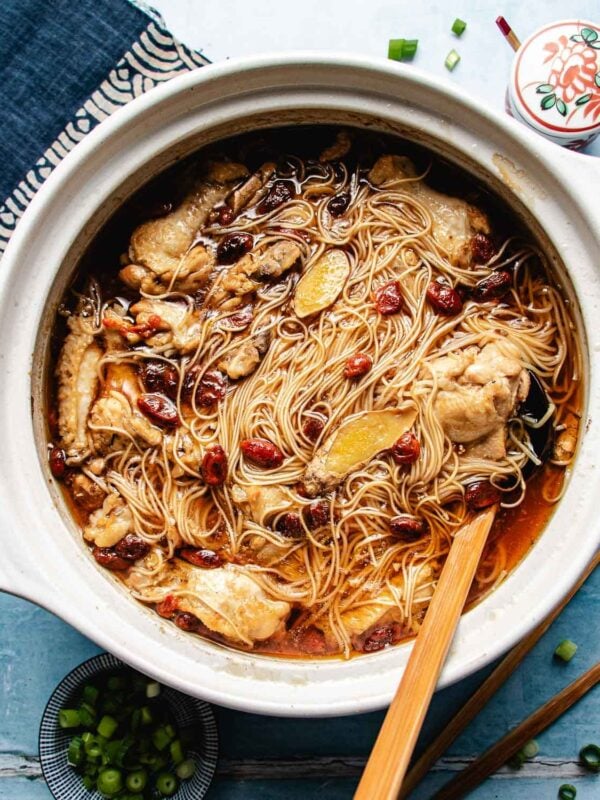
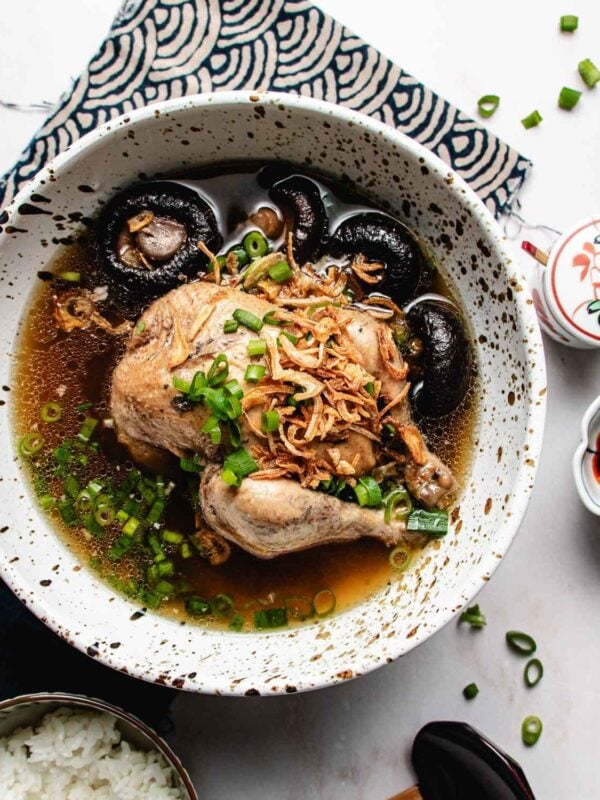
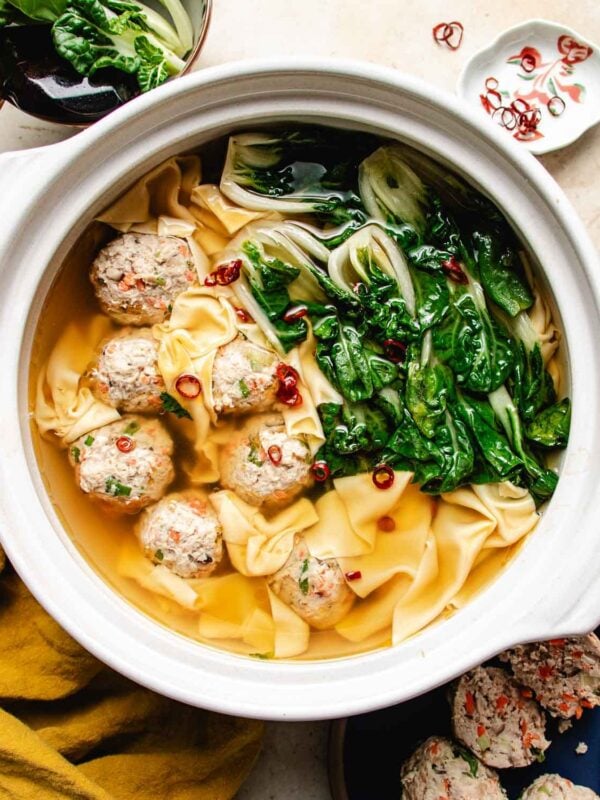
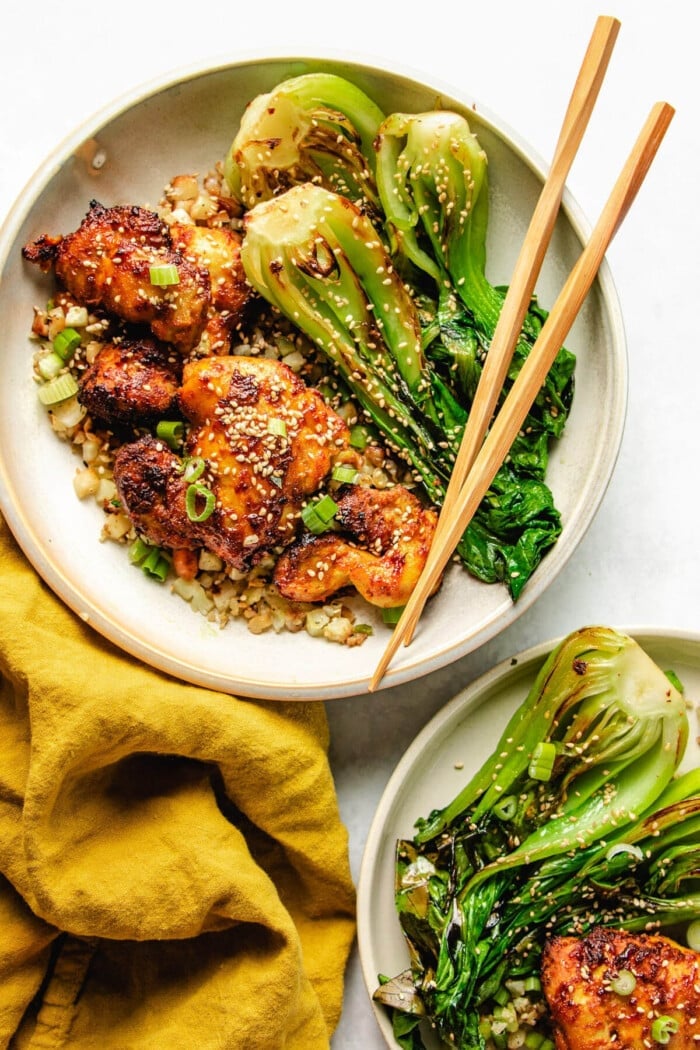








Excellent!! I made it today and hubby absolutely loved it!! Thank you for the recipe!
Just made this – so good. I loved the broth! I couldn’t resist throwing a spoonful of chili crisp on top. Glad to have discovered your blog!
Thank you!
Delicious as always. I continue to use your recipes and have not disliked even one yet. So tasty.
Whoa, so much flavor in one bowl! Love that I can make this at home now. Thanks!
I love this!!! No bok choy today so I just threw in spinach. My guys loved it . . . thank you!
I love dan dan noodles – thank you for a lighter and delicious way to enjoy it! Can’t wait to use the shirataki noodles!
Everything about these noodles is so delicious and comforting! So satisfying but still light!
Made this recipe for my family and it was a big hit! Love love love the flavors. Thank you so much for creating healthy Asian recipes!!!
How spicy is this dish and how can the spice be adjusted?
Hi Stacy, great question. So I wanted to make the dish that tastes as authentic as possible so it is a spicy noodle dish but in a good way. 🙂
Be that as it may, I do have another non-spicy dan dan noodles recipe – https://iheartumami.com/paleo-dan-dan-noodles/
So flavorful! I love dan dan noodles and the shritaki noodles are perfect for this.